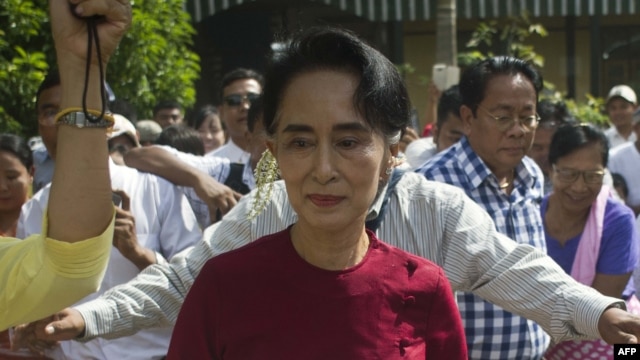In Myanmar Election, Lessons for Cambodia
Koul Panha,
head of the election monitoring watchdog Comfrel, said the people in
Myanmar have been respectful to each other following the election.
Myanmar
opposition leader and head of the National League for Democracy (NLD)
Aung San Suu Kyi (C) visits a polling station in Kawhmu township,
Yangon, Nov. 8, 2015.
PHNOM PENH—A Cambodian election observer in Myanmar says the country’s process holds lessons for Cambodia.
Speaking to VOA Khmer from Myanmar, just after the elections, Koul
Panha, head of the election monitoring watchdog Comfrel, said people
have been respectful to each other following voting, which delivered a
victory to the National League for Democracy and Aung San Suu Kyi.
“They are careful,” he said of Myanmar citizens, post-election. “They don’t humiliate the other side after the election, or make threats, or mobilize troops to intimidate one another. If Myanmar in one more month can peacefully transfer power, I think that’s what Cambodia needs to learn from.”
Historically, Southeast Asian nations have struggled with power transfers, he said. Myanmar, also known as Burma, was under military rule for decades prior to the democratic reform that led to this week’s election.
Yet the NLD and the ruling junta have tried to resolve their differences, leading up to the opposition’s election victory, said Koul Panha, who has been in Myanmar since Nov. 3, monitoring the elections.
The process was peaceful and without intimidation or irregularities, he said. A positive attitude swept the country, even as the NLD swept the elections. Now Suu Kyi and her party will form a government, as the county makes its next step toward reform.
“They are careful,” he said of Myanmar citizens, post-election. “They don’t humiliate the other side after the election, or make threats, or mobilize troops to intimidate one another. If Myanmar in one more month can peacefully transfer power, I think that’s what Cambodia needs to learn from.”
Historically, Southeast Asian nations have struggled with power transfers, he said. Myanmar, also known as Burma, was under military rule for decades prior to the democratic reform that led to this week’s election.
Yet the NLD and the ruling junta have tried to resolve their differences, leading up to the opposition’s election victory, said Koul Panha, who has been in Myanmar since Nov. 3, monitoring the elections.
The process was peaceful and without intimidation or irregularities, he said. A positive attitude swept the country, even as the NLD swept the elections. Now Suu Kyi and her party will form a government, as the county makes its next step toward reform.



No comments:
Post a Comment